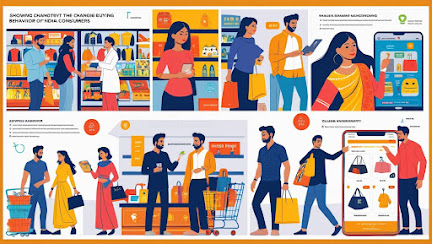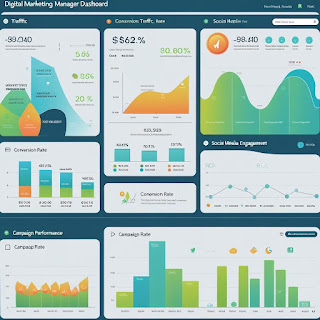Indian_consumer_in_Digital_World
Here are the unique characteristics of the Indian consumer :
-
Highly Price-Sensitive – Looks for value for money and bargains.
-
Diverse Preferences – Varies widely across regions, languages, cultures, and income levels.
-
Mobile-First & Digitally Savvy – Accesses internet mainly via smartphones, embracing digital payments and e-commerce.
-
Family-Centric Decision Making – Purchases often influenced by family and community opinions.
-
Festival & Occasion-Driven Buying – Shopping spikes during festivals and special occasions.
-
Aspirational & Brand-Conscious – Seeks global brands but at affordable prices.
-
Hybrid Buying Behavior – Researches online but often purchases offline (ROPO).
-
Preference for Localized Products – Prefers products tailored to local tastes, languages, and cultural nuances.
-
Youth-Driven Market – Over 50% under 30, tech-savvy and experimental consumers.
-
Trust & Relationship-Oriented – Relies heavily on word-of-mouth, reviews, and trusted brands.
-
Mix of Tradition and Modernity – Balances modern lifestyle with cultural and traditional values.
-
Tiered Market Behavior – Different consumption patterns in Tier 1, 2, and 3 cities and rural areas.
🌐 Internet Penetration in India
-
Total Internet Users: India is projected to surpass 900 million internet users by 2025, marking a significant milestone in digital adoption.
-
Urban vs. Rural Distribution: Rural India now accounts for 55% of the total internet user base, with 488 million users, outpacing urban regions. This shift underscores the growing digital inclusion beyond metropolitan areas.
-
Penetration Rate: As of January 2025, approximately 55.3% of India's population had internet access, indicating a steady increase in connectivity.
- How has indian consumer adapted himself to changing digital world in points
Mobile-First Access
-
Primarily uses smartphones to access the internet and digital services.
-
-
Embracing Digital Payments
-
Widely adopted UPI, mobile wallets, and contactless payments, reducing cash dependency.
-
-
Growing E-commerce Adoption
-
Shifted from offline to online shopping, exploring new categories and platforms.
-
-
Hybrid Buying Behavior (ROPO)
-
Researches products online but often buys offline, blending digital and physical channels.
-
-
Increased Consumption of Regional Language Content
-
Engages with digital content in local languages on social media, OTT platforms, and apps.
-
-
Social Media as a Purchase Influencer
-
Relies on influencers, peer reviews, and social media trends for product discovery.
-
-
Using Digital Platforms for Services
-
Adopts telemedicine, online education, ride-hailing, and food delivery apps rapidly.
-
-
Comfort with Online Transactions
-
Gains trust in online payments, online banking, and digital finance products.
-
-
Adoption of Digital Credit & BNPL
-
Uses Buy Now Pay Later options and digital loans to afford high-value purchases.
-
-
Digital Literacy Growth
-
New users are learning to navigate apps, websites, and digital tools confidently.
-
-
Preference for Convenience & Speed
-
Favors quick commerce, subscription services, and easy-to-use digital interfaces.
-
-
Increased Awareness of Online Security
-
Becoming more cautious about data privacy and secure transactions.
-
-
Participating in Online Communities
-
Joins WhatsApp groups, forums, and social platforms for recommendations and support.
-
-
Adapting to New Technologies
-
Open to using AI-based services, voice assistants, and regional language chatbots.
-
-
Using Digital Tools for Savings & Investments
-
Uses apps for mutual funds, stocks, and insurance alongside traditional methods.
🛍️ Changing Buying Behavior of Indian Consumers
-
Click Over Brick – Online shopping is now the norm.
-
Deal Hunters – Value for money > brand loyalty.
-
Influencers Rule – Social media sways purchase decisions.
-
Go Local, Go Green – Preference for eco-friendly, made-in-India products.
-
Health is Wealth – Surge in wellness and organic buys.
-
Personal Touch – Customization is in demand.
-
Fast & Furious – Quick commerce fuels instant buys.
-
Mix & Match – Online + offline = perfect shopping blend.
-
Brand Hopping – Easy switch if the deal is better.
-
Small Town, Big Market – Tier 2 & 3 cities drive digital growth.
Which brands are indian very loyal ?
Indian consumers tend to be very loyal to certain homegrown and trusted brands, especially those that have been in the market for a long time, deliver consistent quality, and connect culturally. Here’s a list of Indian brands that enjoy high consumer loyalty:
Tata Group – Trusted across sectors (tea, salt, cars, jewellery).
-
Amul – Loved for dairy, iconic and affordable.
-
Parle – Emotional connect with biscuits like Parle-G.
-
Haldiram's – Preferred for authentic Indian snacks.
-
LIC – Trusted insurance provider for decades.
-
Godrej – Reliable for appliances and home products.
-
Asian Paints – Market leader in paints, known for quality.
-
Raymond – Premium brand in men’s clothing.
-
Nirma – Popular for budget-friendly cleaning products.
-
Dabur / Patanjali / Himalaya – Trusted in herbal and ayurvedic care.




.png)


Comments
Post a Comment